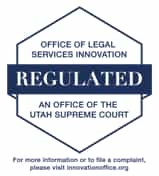Tax Debt Relief for Individuals
Utah Tax Attorneys in South Jordan
If you are facing tax debt, you may be frightened, stressed, and confused about where to turn. The arm of the Internal Revenue Service is long and the government has many skilled employees whose job is to collect what they believe they are owed. If you owe a significant amount of tax debt, you probably have many questions but are not sure where to go to get answers. Pearson Butler can help.
Why Shouldn’t I Just Ignore or Put Off the Debt?
The worst thing to do is to ignore or put off income tax debt. If you do not file a return because you owe, the IRS will add a monthly penalty of 5% to what is already owed. In addition, interest accrues on the taxes and penalties owed, adding to the amount you must pay. Therefore, ignoring the fact that taxes are owed could lead to you owing hundreds, even thousands, more dollars over time. There are options, such as extensions and installment agreements, available through the federal government that can help but you must arrange for those before the taxes are significantly overdue.
If you have a significant tax debt and your balance is considerably overdue, you need the advice of a knowledgeable, experienced tax attorney in Utah. Call (800) 265-2314.
What Can the IRS Do, Besides Attempt to Collect What I Owe?
If you knowingly fail to file income tax returns, you may face criminal charges. If you have not filed taxes in several years, you are more likely to face prosecution. If they do choose to prosecute you criminally, the IRS does not have to prove the exact amount you owe. They have programs in place to catch those who do not file.
How Far Back Can the IRS Go to Collect?
Although the IRS has a general policy of not enforcing returns more than six years old, they can and have collected taxes, interest, and penalties for everything owed over the years.
What Is the Collection Process for Delinquent Tax Debt?
The IRS has a set procedure regarding collection of unpaid taxes. If you filed your return on April 15, which is the peak day for filing, but did not submit your payment, it could take 6 to 8 weeks to determine what you owe. If you file on January 15, the amount you owe will be determined sooner, but you have until April 15 to pay the balance in full.
Once the IRS determines that you have not paid, a computer issues a series of three bills that are sent over a six-month period. If you have not paid at the end of the six months, your account goes to collections. At this point, the IRS may accelerate collection activity. For this reason, if you cannot pay the balance owed by October 15, contacting a qualified tax attorney is your best option to avoid more severe collection actions.
How Much Power Does the IRS Have to Collect What Is Owed?
The IRS has significant power when it comes to collecting what is owed to them. If you have not paid at the end of the six-month initial collection period, you may receive a Notice of Intent to Levy. If you do not contact the IRS at that point, they can seize your bank accounts, garnish your wages, or send levy requests to any company that has issued a 1099 to you, which can be embarrassing.
The IRS can also file tax liens against your property, including your home, business, or other assets. A Notice of Federal Tax Lien is filed as a public record, meaning that anyone can access the information at a local courthouse or through online court record programs. A Federal Tax Lien also appears on your credit report and can harm your credit rating, which may be used by an employer, insurance company, or rental agency. In most cases, the tax lien cannot be released until all taxes, penalties, and interest are paid in full.
In extreme cases, the IRS may seize your property, including your car, boat, or home, in order to sell it and settle the amount owed. The agency may also apply any future federal or state refunds to those owed from previous years.
Are There Any Relief Programs Available from the IRS?
The IRS offers taxpayers who are unable to pay their bill on time several different methods for payment. They include:
- The Fresh Start Initiative program was expanded in 2012 and is designed for taxpayers who are struggling to pay their tax debt. The expansion allows taxpayers who have been unemployed for more than 30 days to avoid the failure-to-pay penalties and doubled the dollar threshold for installment agreement plans. Under the plan, if you have been unemployed for 30 days or more, there is a 6-month grace period for penalties if your income is less than $200,000 if filing as married-filing-jointly or $100,000 if filing single or head-of-household. In addition, if you owe more than $50,000 you may enter the streamlined agreement that requires less documentation for installment payments.
- An Offer in Compromise allows you to settle your tax debt for less than the full amount owed. The IRS considers several factors before permitting an offer in compromise, including your ability to pay, your income, expenses, and asset equity. In addition, you must be current with any payment agreements and are not eligible if there are any open bankruptcy proceedings. Submitting an offer in compromise requires a significant amount of documentation, several official IRS forms, and other steps that can be complicated to complete. Therefore, it is highly recommended that you work with a qualified tax attorney before attempting to offer a settlement with the IRS. Although there is an appeal process if a request is denied, a rejection may make it far more difficult to resolve your tax debt in a way that you can afford.
-
The
Innocent Spouse Relief program allows a spouse to get relief from what is known as joint and
several liabilities, which means that both spouses are held liable for
all the tax due even if one spouse earned all the income or made errors
on the tax form. There are specific conditions that must be met in order
to qualify for Innocent Spouse Relief. Because the requirements are strict,
it is advisable to discuss the situation with a tax lawyer before filing
forms for this tax relief. There are three types of Innocent Spouse Relief:
- Innocent Spouse Relief provides you with relief if your spouse or ex-spouse failed to report income or claimed improper deductions.
- Separation of Liability Relief allows you to allocate a percentage of the tax owed to each spouse after separation.
- Equitable Relief may apply if something on the return was not reported properly that is generally applicable to your spouse. You may also qualify if correct amounts were reported but the tax was not paid with the return.
- Hardship Status when the IRS determines that a levy would create a hardship for the taxpayer, they may classify the tax as "not currently collectible." A hardship is present if the levy action would prevent you from meeting necessary expenses. To qualify for hardship, the IRS requires a significant amount of financial information, including income and living expenses, valuation of assets, and any liabilities. The IRS compares the information provided with their data on reasonable living expenses. If any expenses are deemed to be higher than reasonable, the IRS could deny your request. For this reason, discussing a possible hardship status claim with the IRS is recommended to be sure your expenses are justifiable and meet the IRS requirements.
Why Should I Hire an Attorney to Fix My Tax Debt Problems?
Anyone who has received a notice from the IRS, regardless of how minor the correction is, knows the stress such a notice can cause. The stress grows even stronger if the IRS does not respond to your request or appears to ignore your explanations. An experienced tax attorney can contact the IRS on your behalf, wording correspondence in a direct way that will get the attention of the IRS more quickly than one drafted by an individual. In addition, a qualified attorney will have information on who to contact at the agency to get the quickest response from the agency.
Negotiating with the IRS can be difficult, complicated, and confusing. Working with a knowledgeable attorney is the best way to deal with tax debt issues in a way that will be beneficial for both you and the IRS.
Why Should I Choose Your Firm to Help Me with My IRS Debt?
The team at Pearson Butler has been helping individuals with their tax debt for years. Pearson Butler has success in helping clients gain non-collectible status, also known as hardship status, so that the IRS stops attempting collection on the account. The firm has also succeeded in obtaining Offers-in-Compromise for many clients, settling the tax debts for far less than what the IRS claimed the taxpayer owed. They have successfully removed tax levies, wage attachments, and halted property seizures for their clients.
The firm’s Utah tax attorneys personally meet with clients and review their specific tax debt needs, using the information obtained in that meeting to determine which of the tax relief programs may apply. Unlike some law firms that simply file forms or shuffle paperwork, Pearson Butler works quickly to stop collections during the negotiation process. The firm prides itself on providing a realistic course of action that will reduce their debt without providing unrealistic promises.
One of the most important features of Pearson Butler is local representation, making it easy for you to call or speak to your attorney in person regarding IRS tax debt concerns. The firm works hard to remove the tax debt burden from the client, relieving stress and letting them breathe a sigh of relief knowing that their IRS problems are being handled by a professional who understands. Pearson Butler not only understands what the client is going through but how to deal with the IRS to get the best results.
If you or a loved one is dealing with tax debt and you are not sure what your next step should be, contact Pearson Butler online or by telephone at (800) 265-2314.





.jpg)








